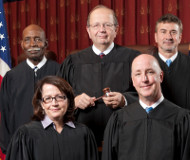4/2/2014
Indiana: Officer Testimony Overrules Video EvidenceIndiana Supreme Court rules that appellate judges may not overrule a trial judge by watching video evidence of a traffic stop.

Videotape evidence can be overruled by the testimony and after-the-fact interpretation of a police officer, the Indiana Supreme Court ruled last week. In a 6 to 1 decision, justices overruled the state Court of Appeals which reviewed dashcam footage of Joanna S. Robinson driving her Chrysler PT Cruiser at around 1am on October 15, 2011 in Elkhart County and found no evidence of a crime.
Sheriff's Deputy Casey Claeys followed Robinson on County Road 4, and he testified that he saw her "drive off the right side, which was the south side of the road, twice." He conducted a traffic stop which led to her being busted for driving under the influence of alcohol (DUI) after her breathalyzer reading was 0.01 over the legal limit. She also was carrying a small amount of marijuana. The justices, however, only concerned themselves with whether the initial traffic stop was justified. Elkhart Superior Court Judge Charles Carter Wicks concluded that the stop was justified when the case came to trial.
"I reviewed the video on approximately ten occasions and cannot conclude from the video that the defendant's vehicle actually left the roadway," Judge Wicks found. "But it does show the vehicle veering on two occasions onto the white fog line."
The trial judge found the deputy's experience was more accurate than the videotape, but the appeals court reversed, saying the video showed what appeared to be no more than a driver momentarily distracted. The state Supreme Court concluded the trial judge had it right the first time.
"Deputy Claeys, as he drove down County Road 4 on that October night, was observing Robinson's vehicle through the lens of his experience and expertise," Justice Mark S. Massa wrote for the majority. "And when Deputy Claeys testified at the suppression hearing, the trial judge heard his testimony -- along with the other witness testimony and evidence, including the video -- through the lens of his experience and expertise. Ultimately, that experience and expertise led the trial judge to weigh Deputy Claeys's testimony more heavily than the video evidence, and we decline Robinson's invitation to substitute our own judgment for that of the trial court and rebalance the scales in her favor."
In Indiana v. Keck, a companion case decided on the same day, the high court admonished appellate courts not to reweigh evidence that has already been evaluated at trial.
"Our trial judges are able to see and hear the witnesses and other evidence first-hand," the justices unanimously held. "But the appellate bench, in a far corner of the upper deck, doesn't provide such a clear view. Remote from the hearing in time and frequently in distance, we review a cold paper record. Thus, unless that record leads us to conclude the trial judge made a clear error in his findings of fact, we will apply the law de novo to the facts as the trial court found them."
A copy of the decision is available in a 140k PDF file at the source link below.


